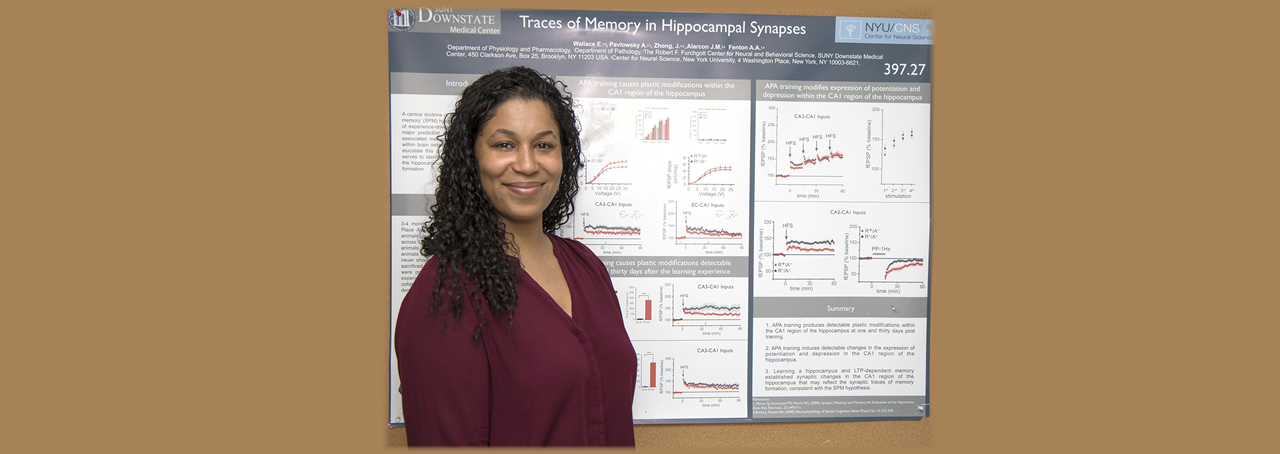Pipeline to success
In 2007, Emma Wallace was one of eight high-achieving CUNY students who won a prestigious Salk Scholarship, honoring the legacy of Dr. Jonas E. Salk, who developed the polio vaccine in 1955. As an MD/PhD student at SUNY Downstate Medical Center, Wallace is charting a course for innovation in memory research, while also setting an example for her young son and for women in science.
“Memory is fascinating; I believe it is truly the essence of our being,” Wallace says. “If we can understand how our brains change as a function of memory formation, we can then begin to understand the brain when people begin to have trouble with their memory. Perhaps at some point in time we will have the tools to help prevent memory loss, but it all starts with understanding how memories are laid down within the circuits of the brain.”
Wallace received her PhD degree in 2015 and is on track to receive her MD degree this spring, thanks in large measure to pipeline programs that Downstate offers to students interested in careers in science and medicine. A single parent, Wallace's path to science began by getting her GED, and then enrolling in CUNY's Medgar Evers College, located in Brooklyn, New York, close to Downstate. While still an undergraduate at Medgar Evers, she enrolled in two Downstate pipeline programs.
The first, the Early Medical Education and Graduate track, allowed Wallace to participate in didactic and research coursework while engaging in clinical and laboratory exposure. The Summer Research Program, offered jointly by Downstate's School of Graduate Studies and the Office of Diversity, Education, and Research, gave her the opportunity to join a basic science lab that was heavily involved in memory research.
"I imagined that my time as an undergraduate researcher would be limited to a few summers until I entered medical school," Wallace recalls. "I did not expect that I would fall in love with research!"
The lab Wallace joined was headed by Dr. Andre Fenton, and the opportunity to join his lab was unique. In a discovery that may one day lead to new treatments for patients with Alzheimer’s disease, Fenton and Dr. Todd Sacktor, distinguished professor of physiology and pharmacology, anesthesiology, and neurology, reported that a single molecule, protein kinase M zeta (PKMzeta), is an essential molecular mechanism of long-term memory storage. The discovery was named one of the top ten breakthroughs of 2006 by Science magazine.
Wallace continued on in Fenton's lab as an undergraduate student at Medgar Evers and then, after being accepted to Downstate's joint MD/PhD program, as a doctoral candidate in his lab. "Dr. Fenton was such a supportive mentor," Wallace recalls. "He saw that I was truly interested in becoming a scientist while just a sophomore in college. He helped to foster my love for science."
Recently, a paper Wallace co-authored in the journal eLife confirmed that PKMzeta acts as the primary memory storage mechanism for long-term memory. However, in the face of dysfunction, there are redundancies in the memory storage machinery of the brain. This finding, Wallace says, is important because it opens new avenues for scientists to explore that may one day help patients with memory dysfunction.
Wallace’s research on the molecular mechanisms of memory was, in part, motivated by the loss of her grandmother to Alzheimer’s disease, the most common form of dementia and, according to the Alzheimer’s Association, the sixth leading cause of death in the United States. As the disease advances, memory-related symptoms can include problems such as understanding or expressing language, disorientation, and difficulties in planning. Because of her grandmother's illness, Wallace found that her research on memory mechanisms struck a deeply personal chord.
Wallace has always been determined in her research and in life. As a single mother, Wallace frequently conducted her research late into the evening after completing classes at Downstate and her responsibilities as a parent.
At Medgar Evers, the quality of her work, academic excellence, and recommendations by professors and mentors made her a star. Her mentor, the award-winning biology professor and cancer researcher Dr. Charles desBordes, was encouraging and supportive even before she started.
“I remember our first meeting, with my son in tow as a baby,” says Wallace. “We met and discussed my career plans before I even enrolled at Medgar Evers. I initially told him that I wanted to become a registered nurse so that I could support my son, and eventually return to school to pursue my MD degree. He said to me ‘Emma, if you want to become a doctor, become a doctor. You will find a way even with your little son.’ ”
Wallace’s goal is to stay in New York for her residency and then continue as a practicing physician-scientist. Her son, she says, is her inspiration. Many would argue that Wallace is also an inspiration for a generation of female scientists.
“If I could speak to other students who have received a GED and have aspirations of becoming a physician-scientist, I would tell them don't be deterred, hold on to your dream, and work towards it every day,” Wallace says. “I have participated in mentoring young women interested in science through the NeXXt Scholars Program operated by the New York Academy of Sciences. I hope to continue to mentor young women and positively shape their view of the sciences.”
comments powered by Disqus


